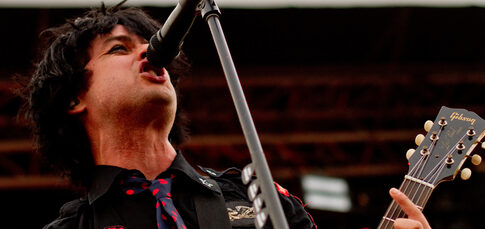Green Day's frontman Billie Joe Armstrong once again stirred controversy, this time by holding up a rubber head resembling former President Donald Trump during a recent concert. The incident occurred less than a month after a thwarted assassination attempt on Trump, further inflaming tensions among his supporters.
During a live performance, Armstrong brandished the mock head, an act reminiscent of Kathy Griffin's 2017 photo shoot that sparked nationwide outrage. This provocative gesture has reignited debates over the boundaries of political expression and artistic freedom in today's polarized climate.
Green Day had a concert here in DC last night.
They decided it’d be a good idea to hold up a severed Trump head.
Just TWO WEEKS after he was sh*t in the head.
These people are SICK. pic.twitter.com/Fn7eP4RTFQ
— Nick Sortor (@nicksortor) July 30, 2024
Armstrong, known for his outspoken political views, has never shied away from controversy. He has been a vocal critic of Trump, often using his platform to express his disapproval. At the concert, Armstrong's actions were met with a mix of cheers and jeers from the audience, reflecting the nation's deep political divide.
Trump supporters were quick to condemn Armstrong's stunt, taking to social media to express their outrage. Some called for boycotts of Green Day's music, while others accused Armstrong of inciting violence. "This is disgusting and unacceptable, especially given the recent attempt on President Trump's life," tweeted one user, echoing a sentiment shared by many.
🔥🚨BREAKING: Billy Joe Armstrong, lead singer for Green Day, protested in a disgusting way by holding a Donald Trump mask which to many viewers claim represents a dead or defeated Trump while performing in DC barely 2 weeks after his Donald Trump was nearly assassinated.… pic.twitter.com/K0HMM8r3mC
— Dom Lucre | Breaker of Narratives (@dom_lucre) July 30, 2024
Elon Musk, CEO of X (formerly Twitter), also weighed in on the controversy, criticizing Armstrong for politicizing his performance. Musk's comment, "Green Day goes from raging against the machine to milquetoastedly raging for it," received widespread attention, highlighting the polarized reactions to Armstrong's act.
This isn't the first time Armstrong has used his platform to make a political statement. Earlier this year, during a performance on "Dick Clark's New Year's Rockin' Eve," he altered the lyrics of Green Day's hit song "American Idiot" to include a jab at Trump's MAGA supporters. Such actions have solidified his reputation as a provocateur within the music industry.
Critics argue that Armstrong's latest stunt is a step too far, particularly in the wake of the assassination attempt. They claim that his actions could be interpreted as promoting violence against political figures. Supporters, however, defend his right to free speech and view the gesture as a form of protest against what they see as a dangerous and divisive political figure.
The concert incident underscores the ongoing tension between artists and political figures in America. As the country grapples with its political future, acts like Armstrong's continue to spark debates about the role of art and music in political discourse. Whether seen as a bold statement or a reckless provocation, Armstrong's actions have once again placed Green Day at the center of a national conversation about free expression and its limits.


